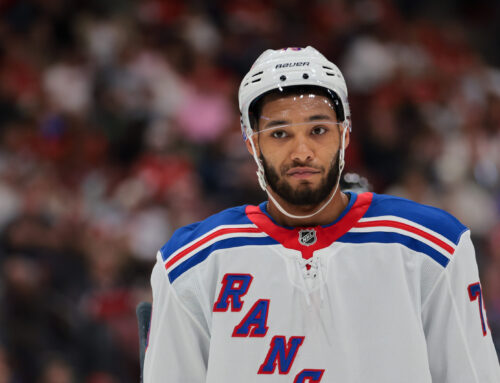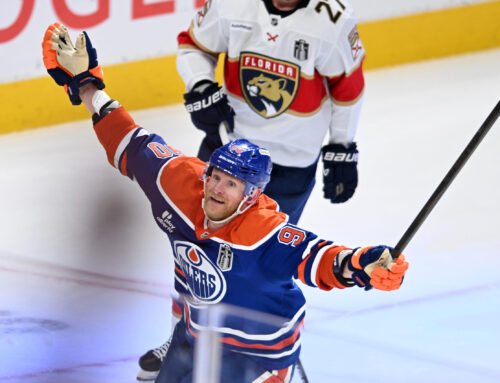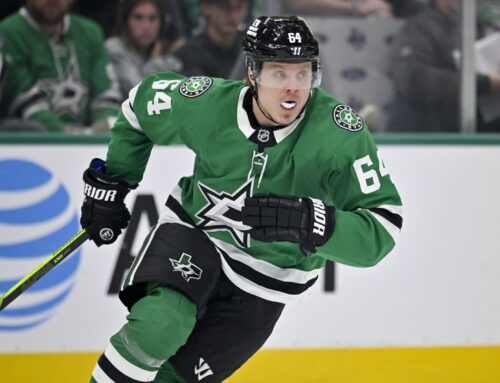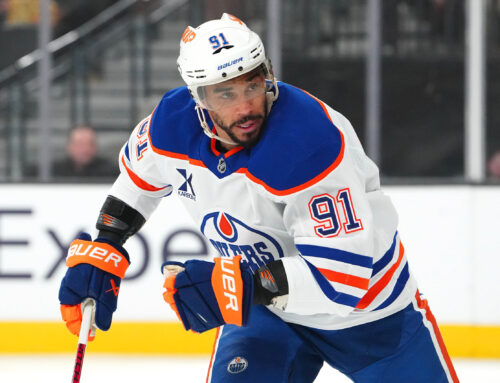Every preseason, almost every prognosticator puts out an article that talks about hockey players due for a bounce-back season.
While some players are successful, others often fail. I believe one reason is the high expectations on a player whose career year is an anomaly. Imagine a player who routinely gets 50 points breaks through for a 75-point campaign before going back to his usual 50-point pace. The next year, that player becomes a popular pick for a rebound season. It's almost as if that one abnormal season is what that player is always capable of.
Even more concerning for some of the players on this list are those who routinely put up good seasons before struggling last year. If they made this list, that means they didn't rally and have now posted two subpar years back-to-back.
To come up with this ranking, I looked back at numerous columns and took some of the more common choices for bounce-back campaigns.
10. Braden Holtby
Technically speaking, Holtby has probably been listed as a bounce-back candidate every year starting in 2017-18. That season, he had a 2.99 GAA and 0.907 SV%, and he's hovered around those numbers since then. Once Holtby signed in Vancouver last year, many had him pegged to bounce back, which didn't make sense. He was going to a much-worse team and had to contend with a backup projected to be the goalie of the future in Vancouver that would easily steal starts.
The Russian Washington Capital may also be a leading contender for any list that talks about players needing a fresh start. His production has worryingly dropped for several years in a row, from an 86-point pace four seasons ago to 78 to 68 to 58 this season. He's now taking fewer than two shots per game, and his power-play production has also cratered. I'm wondering if we're at the stage where Washington offers Seattle a prospect/pick to take Kuznetsov and his $7.8 million salary off their hands.
Karlsson was my biggest miss for this past season, as I thought for sure he was due for a better season. Even if he couldn't reach an 80-point pace, I figured 70 was doable for the San Jose Shark as he was finally healthy and seemed to be in a good place mentally and emotionally. While he stayed off the IR, he struggled the whole season and was droppable early on. Not only did he not rebound to his 70-point ways, but he wound up with a 35-point pace this season.
Giroux has had a bit of a strange career. For a stretch, he seems elite. Then he struggles for a couple of years and everyone is warned to stay away from him in fantasy hockey. Then he becomes elite again and the cycle repeats. After back-to-back seasons of 101 and 85 points, Giroux wound up with a 63-point pace last season. Many thought he was a great candidate to recover, but he wound up with a 65-point pace this season. To make matters worse, his power-play production was down, his shots-per-game mark dropped from 2.9 to 2.2, his ice time dropped almost three minutes a night from a couple of years ago and he was a negative for plus/minus.
6. Max Domi
This might have been a case of too many people expecting too much from Domi. In Arizona, he averaged 50 points over 82 games. In his first season with Montreal, he had a 72-point pace before dropping back to a 51-point pace in his second year with the Canadiens. Unless you believe four of his five seasons were the anomalies and the 72-point pace was his normal pace, what were people thinking he could bounce back to? Yet he was a popular pick in preseason lists. Well, he struggled in Columbus and finished with an 82-game pace of 36 points. Next season will be the year you should call him a bounce-back candidate as you hope he gets back to his normal 50-point pace.
This might be a bit of a sensitive choice for anyone who has him on their team in leagues with peripherals. You need Gaudreau to produce as he doesn't contribute to hits, PIM, plus/minus or blocked shots. When he put up 84 points in 2017-18, fantasy GMs were thrilled. The next season, he put up 99 points and fantasy GMs were euphoric. When he dropped to a 68-point pace last year, there was much discontent. Many were hoping that he could get back to his lofty heights this season. Not only did he put up another 70-point pace, but his ice time was the lowest it has been in seven years.
4. Taylor Hall
Hall is a player whose expectations have consistently been too high. I once wrote that Hall is now a 60-point player who had an obscene 1.3 years in New Jersey that convinces fantasy general managers that Hall is more productive than he is. However, many kept believing Hall would rebound from a 66-point pace in 2019-20. Much of the reason for the rebound projections was that Hall was going to play alongside an elite player in Jack Eichel, but it never worked out. The only reason Hall's season was even fantasy relevant was because he was dealt to Boston, as 14 points in 16 games with the Bruins pushed him to a 51-point pace.
After signing a huge contract two summers ago and then hindering the team in his first season, many imagined he could get back to his old ways. While Bob's win/loss record was solid, his lack of peripherals meant the team chose to go with other netminders. It's never a good thing when the team chooses to go with the backup and a 20-year-old rookie in the postseason instead of the netminder signed to a massive contract. It's going to be interesting to see what happens to Bobrovsky in the coming years.
2. Matt Dumba
A couple of seasons back, Dumba looked like he would be the next consistent 50-point defenseman, but then an injury cost him most of the 2018-19 season. Last year, it seemed as if he was struggling with the injury, and he finished with an 82-game pace of 29 points. Projections had him potentially getting back to that 50-point pace, but too many things went wrong. He was removed from the top power-play unit and his shot rate dropped to 1.7 shots per game. He wound up with an 82-game pace of 34 points, which was an improvement but way below what many were expecting.
Truthfully, many Nashville players could have made this list, but Arvidsson was the most popular player in pre-season lists. In three seasons from 2016-17 to 2018-19, Arvidsson had an 82-game pace of at least 30 goals and 64 points. In 2019-20, that dropped to a pace of 22 goals and 40 points. Many were thinking he might rally, but he finished with an 82-game rate of 16 goals and 41 points.





 CHI
CHI SEA
SEA FLA
FLA DAL
DAL WPG
WPG CBJ
CBJ L.A
L.A MIN
MIN DET
DET EDM
EDM
